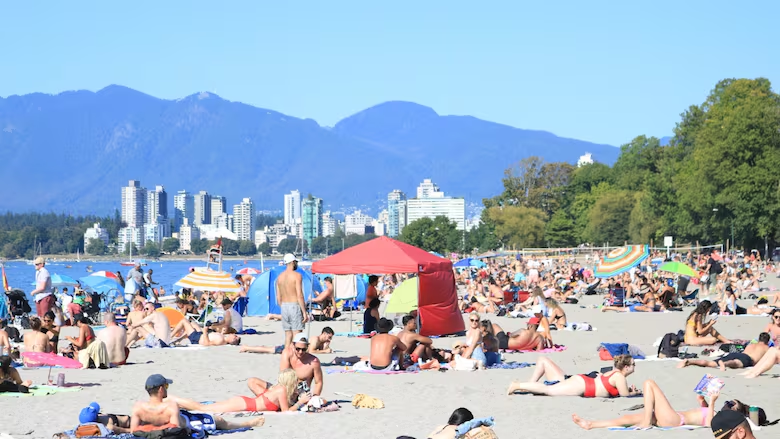Several Vancouver beaches are closed to swimmers this weekend due to high levels of E. coli in the water. The closures come just as the city prepares for major events, including the Vancouver Folk Music Festival and the Honda Celebration of Light fireworks.
Vancouver Coastal Health has marked nine beaches as unsafe for swimming. These are Ambleside Beach, Wreck Beach, English Bay, Kitsilano Beach, Second Beach, Sunset Beach, Third Beach, Lions Bay, and Trout Lake. The unsafe levels of E. coli present a health risk to the public.
Three more beaches — Dundarave Beach, Sandy Beach, and Eagle Harbour — have shown higher-than-normal E. coli levels, though they are not yet restricted for swimming. Health officials are keeping a close watch on them.
Michael Schwandt, a medical health officer with Vancouver Coastal Health, said that having this many beaches closed at the same time is unusual. Normally, only one or two may be flagged, but having nine beaches listed as not suitable for swimming is rare.
Schwandt explained that possible sources of the contamination include sewage leaks, animal waste, and runoff from streets and parks. Discharge from recreational boats may also be contributing, especially with more boats in the water for weekend festivals.
Gregary Ford, vice-president of Swim Drink Fish Canada, said E. coli is a naturally occurring bacteria. However, high levels usually point to contamination from human fecal matter. He warned that exposure to this bacteria can cause stomach problems, rashes, eye infections, and ear infections.
He noted that combined sewer systems are a major factor. These systems collect both stormwater and wastewater in the same pipe. When it rains heavily, the system overflows, discharging untreated water directly into lakes and oceans to prevent flooding in homes and streets. This overflow can carry harmful bacteria into public swimming areas.
Ford also pointed out that climate change is likely making the situation worse. Warmer temperatures and more frequent, intense rainstorms increase the chance of overflow events. He emphasized that cities must invest in better systems to handle stormwater.
Replacing old sewer systems with separated pipes is expensive and takes time. In the meantime, many municipalities are turning to green infrastructure. These include rain gardens, bioswales, and stormwater ponds, which help absorb and redirect rainwater before it reaches the sewer system.
Ford stressed the importance of planning now to reduce the risk of water pollution in the future. He said the problem will only grow if cities don’t act quickly.
Stephen Paetkau runs a free mobile boat pump-out service for the city. He helps boaters dispose of their waste properly by pumping it into the city’s sewer system. Paetkau said he has not seen much of a change in demand for the service in recent years.
He believes the boating community has become more responsible, but there is little enforcement of rules that prohibit dumping waste into the water. He added that it is hard to catch violators unless someone witnesses the act directly.
Despite warning signs and yellow tape at places like English Bay, some people continue to swim. Officials are urging everyone to stay out of the water until the beaches are cleared as safe again.
With large crowds expected this weekend, health authorities are continuing to monitor water quality. They are also working with local governments to find the cause of the contamination. Swimmers are advised to check beach advisories before heading out.

